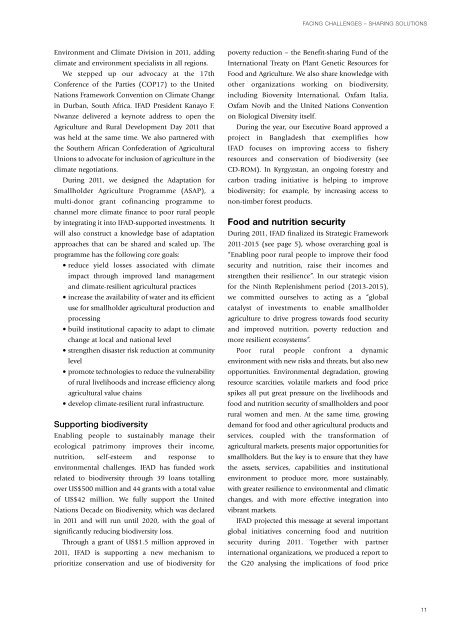ANNUAL REPORT 2011 - IFAD
ANNUAL REPORT 2011 - IFAD
ANNUAL REPORT 2011 - IFAD
You also want an ePaper? Increase the reach of your titles
YUMPU automatically turns print PDFs into web optimized ePapers that Google loves.
Environment and Climate Division in <strong>2011</strong>, adding<br />
climate and environment specialists in all regions.<br />
We stepped up our advocacy at the 17th<br />
Conference of the Parties (COP17) to the United<br />
Nations Framework Convention on Climate Change<br />
in Durban, South Africa. <strong>IFAD</strong> President Kanayo F.<br />
Nwanze delivered a keynote address to open the<br />
Agriculture and Rural Development Day <strong>2011</strong> that<br />
was held at the same time. We also partnered with<br />
the Southern African Confederation of Agricultural<br />
Unions to advocate for inclusion of agriculture in the<br />
climate negotiations.<br />
During <strong>2011</strong>, we designed the Adaptation for<br />
Smallholder Agriculture Programme (ASAP), a<br />
multi-donor grant cofinancing programme to<br />
channel more climate finance to poor rural people<br />
by integrating it into <strong>IFAD</strong>-supported investments. It<br />
will also construct a knowledge base of adaptation<br />
approaches that can be shared and scaled up. The<br />
programme has the following core goals:<br />
• reduce yield losses associated with climate<br />
impact through improved land management<br />
and climate-resilient agricultural practices<br />
• increase the availability of water and its efficient<br />
use for smallholder agricultural production and<br />
processing<br />
• build institutional capacity to adapt to climate<br />
change at local and national level<br />
• strengthen disaster risk reduction at community<br />
level<br />
• promote technologies to reduce the vulnerability<br />
of rural livelihoods and increase efficiency along<br />
agricultural value chains<br />
• develop climate-resilient rural infrastructure.<br />
Supporting biodiversity<br />
Enabling people to sustainably manage their<br />
ecological patrimony improves their income,<br />
nutrition, self-esteem and response to<br />
environmental challenges. <strong>IFAD</strong> has funded work<br />
related to biodiversity through 39 loans totalling<br />
over US$500 million and 44 grants with a total value<br />
of US$42 million. We fully support the United<br />
Nations Decade on Biodiversity, which was declared<br />
in <strong>2011</strong> and will run until 2020, with the goal of<br />
significantly reducing biodiversity loss.<br />
Through a grant of US$1.5 million approved in<br />
<strong>2011</strong>, <strong>IFAD</strong> is supporting a new mechanism to<br />
prioritize conservation and use of biodiversity for<br />
FACING CHALLENGES – SHARING SOLUTIONS<br />
poverty reduction − the Benefit-sharing Fund of the<br />
International Treaty on Plant Genetic Resources for<br />
Food and Agriculture. We also share knowledge with<br />
other organizations working on biodiversity,<br />
including Bioversity International, Oxfam Italia,<br />
Oxfam Novib and the United Nations Convention<br />
on Biological Diversity itself.<br />
During the year, our Executive Board approved a<br />
project in Bangladesh that exemplifies how<br />
<strong>IFAD</strong> focuses on improving access to fishery<br />
resources and conservation of biodiversity (see<br />
CD-ROM). In Kyrgyzstan, an ongoing forestry and<br />
carbon trading initiative is helping to improve<br />
biodiversity; for example, by increasing access to<br />
non-timber forest products.<br />
Food and nutrition security<br />
During <strong>2011</strong>, <strong>IFAD</strong> finalized its Strategic Framework<br />
<strong>2011</strong>-2015 (see page 5), whose overarching goal is<br />
“Enabling poor rural people to improve their food<br />
security and nutrition, raise their incomes and<br />
strengthen their resilience”. In our strategic vision<br />
for the Ninth Replenishment period (2013-2015),<br />
we committed ourselves to acting as a “global<br />
catalyst of investments to enable smallholder<br />
agriculture to drive progress towards food security<br />
and improved nutrition, poverty reduction and<br />
more resilient ecosystems”.<br />
Poor rural people confront a dynamic<br />
environment with new risks and threats, but also new<br />
opportunities. Environmental degradation, growing<br />
resource scarcities, volatile markets and food price<br />
spikes all put great pressure on the livelihoods and<br />
food and nutrition security of smallholders and poor<br />
rural women and men. At the same time, growing<br />
demand for food and other agricultural products and<br />
services, coupled with the transformation of<br />
agricultural markets, presents major opportunities for<br />
smallholders. But the key is to ensure that they have<br />
the assets, services, capabilities and institutional<br />
environment to produce more, more sustainably,<br />
with greater resilience to environmental and climatic<br />
changes, and with more effective integration into<br />
vibrant markets.<br />
<strong>IFAD</strong> projected this message at several important<br />
global initiatives concerning food and nutrition<br />
security during <strong>2011</strong>. Together with partner<br />
international organizations, we produced a report to<br />
the G20 analysing the implications of food price<br />
11

















